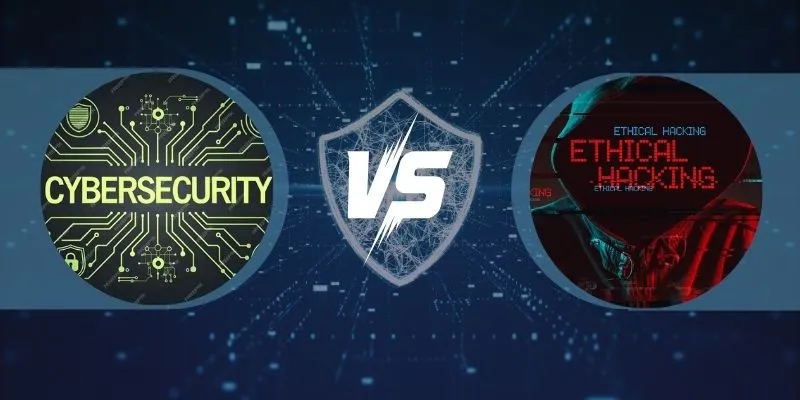
Cyber Security vs Ethical Hacking: Key Differences Explained
Ever lost your phone and felt, "What if someone were reading my personal messages or seeking my confidential bank details?" Scary, right? That’s why cybersecurity and ethical hacking came into existence. Both of them are responsible for helping us secure our personal information from hackers who may misuse it against us.
This writing will take you through the key differences between cybersecurity and ethical hacking in a way that's easy to understand—and let you know every term, even if you have never touched a line of code before.
Are Cybersecurity and Ethical Hacking the Same?
Although the terms "cybersecurity" and "ethical hacking" are often used interchangeably, they have different meanings. Both are indeed in charge of securing your data and protecting it against malicious hackers, but cybersecurity and ethical hacking are distinct fields with different goals. A cybersecurity expert is responsible for building a defense system, whereas ethical hackers are responsible for finding vulnerabilities even before any attack on the system.
What is Cybersecurity?
Cybersecurity simply means protecting computers, phones, and online data from hackers, viruses, and other online threats.
This helps us to keep our confidential information safe and secure from bad guys. Cybersecurity is like a big, strong lock on your digital door.
Here’s what cybersecurity really does:
- Protects your data like a digital bodyguard.
- Stopping viruses, just like washing your hands, protects you from germs.
- Monitors systems to catch anything fishy.
- Builds strong barriers (like firewalls and encryption) so no one sneaks in.
- Trains people to spot tricky stuff like fake emails or weird links.
What is Ethical Hacking?
Ethical hacking means finding and fixing security problems in computers or websites before bad hackers can take advantage of them.
Here, what we usually misunderstand is that hacking is something that leads to a practice that's not right, but let us correct you—hacking does not mean that something that has been done is always wrong, and that's the reason this is not called only hacking but “Ethical Hacking”. Ethical hackers are those guys who basically act like bad ones (with permission) just to check the vulnerability in your systems.
They:
- Try breaking into systems (legally)
- Find problems before real hackers do
- Suggest how to fix those problems
- Think like hackers but stay within the law
- Work only where they are invited
The Real Difference Between Cybersecurity and Ethical Hacking
Alright, now you’re probably thinking—don’t they both protect computers? Yes, but they do it in very different ways.
- Both protect digital systems—but in different ways.
How to Become a Cybersecurity Expert?
To become a cybersecurity expert, it’s not mandatory to have a computer science degree or years of experience in the tech field. Even if you have just completed your 12th and are wondering, how can I get into this field? Then you don’t need to worry; in today’s time, there are many paths to becoming a successful cybersecurity expert.
1. Start with the Basics
2. Understand Cyber Threats
3. Learn the Tools
4. Take a Cyber Security Course
5. Practice What You Learn
6. Stay Updated
How to Become an Ethical Hacker?
Ethical hackers are those curious kids who always ask "Why?" and probably took their toys apart just to see how they work. But now, they do that with computers—and legally!
So, again same like cybersecurity, you don’t need to be proficient in computer skills or a tech genius, but if you are excited to learn more about computers and hacking techniques and ready to learn everything with dedication, then you can also be an ethical hacker. Now, there are many ways to learn ethical hacking from scratch, even if you’re just starting.
Many online platforms like Udemy, Coursera, and TryHackMe, and offline, such as DizitalAdda, offer courses designed for beginners that teach you everything from the basics to advanced hacking techniques — all legally and safely.
1. Build a Strong Foundation
2. Learn About Cyber Threats
3. Master the Tools of the Trade
4. Enroll in Ethical Hacking Courses
5. Practice, Practice, Practice
6. Follow the Rules
7. Keep Learning
How Cyber Security and Ethical Hacking Work Together
Cybersecurity and ethical hacking are intertwined: each strengthens the other. While ethical hacking is proactive in finding vulnerabilities before a malicious hacker can take advantage of them, cybersecurity focuses on defense.
Here’s how they team up:
Hackers test systems that cybersecurity teams build.
Cyber experts fix the issues hackers find.
Both learn from each other to make systems stronger.
Hackers help predict new threats, and cyber teams stop them.
Together, they keep your online life safe.
So, even though their jobs look different, they’re on the same team.